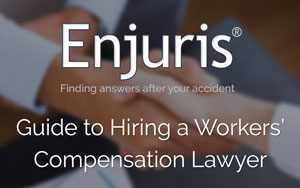Talk with a knowledgeable attorney near Monroe to learn about your workers’ compensation benefits.
Suffering a workplace injury in Monroe can not only be physically debilitating but also mentally and financially devastating as well. Sometimes the incident is sudden—one moment you’re doing your job when a forklift runs over your foot, or you’re lifting something heavy and your back gives out.
Other times, the injury happens over years, like carpal tunnel from repetitive stress or hearing loss from long-term exposure to high noise levels at a construction site. No one expects or wants their working life and career to be cut short unexpectedly.
Here at Wilder Pantazis Law Group, we know you’re hurting and longing for life to return to normal. But that can seem impossible when the insurance company delays or outright denies your claim. That’s where we step in.
Our Monroe work injury attorneys bring over 85 years of workers’ comp experience to every case we take, so you can trust us to ensure your claim is taken seriously and your rights are fully protected.
Don’t let big insurance decide your future. Contact Wilder Pantazis Law Group today to schedule a free consultation.
Tired of getting the runaround from your employer’s workers’ comp insurer?
When experience counts, you can count on Wilder Pantazis Law Group.
Visit our law firm near Monroe, NC
Address
3501 Monroe Rd
Charlotte, NC 28205
Hours
9:00am – 5:00pm (M-F)
Closed Saturday and Sunday
Our law firm is located less than 25 miles from downtown Monroe, in the Echo Hills neighborhood of Charlotte. To visit our office, take US-74 W/E Independence Blvd to exit 245A (Wendover Road). Turn right at Monroe Road and look for our office on the right hand side.
Get legal advice from a top-rated North Carolina lawyer

Every client who comes through our doors is treated like family, and we take pride in understanding your unique story and concerns. We work every day to make our clients’ lives better, to help them recover in all aspects of their lives – financially, emotionally and physically.” – Attorney Beau Wilder
FAQs about workers’ comp claims in Monroe, NC
How do I know if I qualify for workers’ comp after an injury in Monroe?
In most cases, if you’re an employee (not an independent contractor) at a company in North Carolina with 3 or more employees, you’re covered under the state’s workers’ compensation system, although some types of workers are exempt from workers’ comp.
To qualify for benefits, you don’t need to prove that your employer did anything wrong, but you do need to be able to prove that your injury or occupational disease was directly related to your job.
This can be pretty straightforward if you broke your leg in a work-related car accident, but it can be more challenging if you develop a disease like lead poisoning or silicosis that could also be caused by an exposure outside of work.
If you’re unsure about your eligibility for North Carolina workers’ comp or need help proving that your condition is work-related, it’s best to speak with a Monroe work injury attorney who can review your situation and explain your legal options.
What workers’ comp benefits am I entitled to in Monroe, NC?
If you’re injured on the job in Monroe or anywhere else in Union County, you may be eligible for several key workers’ comp benefits to help you recover and stay financially stable. These benefits typically include:
- Indemnity benefits. If your injury keeps you out of work, you may receive temporary disability benefits, which are equal to about two-thirds of your average weekly wage. If you’re left with lasting damage, you may qualify for permanent partial disability (PPD) benefits or permanent total disability (PTD) benefits, depending on how your condition impacts your ability to work.
- Benefits for medical care. All reasonable and necessary care related to your work injury—doctor visits, surgery, therapy, medications, and more—should be covered.
- Vocational rehabilitation benefits. If you can’t return to your previous job, you may be eligible for job retraining or help finding new employment.
- Death benefits. If a work-related injury leads to death, surviving dependents may receive compensation for lost income and coverage for funeral expenses.
If you suffered a serious or catastrophic injury, make sure you speak with a local North Carolina workers’ comp lawyer before accepting a settlement offer to ensure you’re getting the full value of your claim.
What steps are required to file a workers’ comp claim in Monroe, NC?
To file a workers’ comp claim in Monroe, North Carolina, you’ll need to take a few important steps. Failure to take these actions in time can significantly increase your chances of a denied claim:
- Get medical treatment. Always seek medical care as soon as possible. Otherwise, the insurer is likely to use this as a reason to challenge your claim. For non-emergencies, ask your employer for a list of approved doctors. In an emergency, you can go to any provider—but follow up with your employer afterward.
- Notify your employer. Let your boss know about your injury right away, and if possible, do it in writing. North Carolina law requires that you report your injury within 30 days, or you could lose your right to benefits.
- Officially file a claim. Submit Form 18 to the North Carolina Industrial Commission to start your claim. You have up to 2 years from the date of the injury (or diagnosis) to file, but sooner is always better.
If your claim is denied, delayed, or undervalued, reach out to a Monroe workers’ comp lawyer. They can help guide you through the process and fight for the benefits you deserve.

Enjuris Guide to Hiring a Workers’ Compensation Lawyer
Hiring an experienced workers’ compensation attorney in your state ensures you receive proper treatment for your injuries and full compensation for lost wages.
Looking for the best work injury attorney in Monroe, NC, to help with your claim?
If you’ve been injured at work in Monroe, you don’t try to navigate the complicated workers’ comp system alone. At Wilder Pantazis Law Group, our experienced Monroe workers’ compensation lawyers have spent decades helping hardworking people all across North and South Carolina get the medical care and financial support they need after serious job injuries and illnesses.
Whether your claim has already been denied or you’re just not sure you’re getting a fair deal, we’re here to stand up for you. Contact Wilder Pantazis Law Group today for a free consultation, and let us help you turn the corner and move forward with confidence.
About Monroe, North Carolina
As you might suspect, Monroe earned its name from America’s fifth president, James Monroe, and it was founded as a planned settlement. The small town first appeared on maps in 1843 and served as a trading center in the Piedmont region for tobacco and other agricultural products. Monroe is located along the Catawba River, close to the South Carolina border.
About 200 people were residents around the time of the town’s founding. Since then, the population has never contracted. Census records show near-constant growth over the decades, from 2,500 residents in 1900 to more than 10,000 in 1950. Today, more than 37,000 people call Monroe home.
A few famous people who called Monroe home include civil rights activist and Marine veteran Robert F. Williams, NASCAR driver Speedy Thompson, Emmy-award winning recording artist David L. Cook and U.S. Senator Jesse Helms, Jr.
Top employers and industries in Monroe, NC
Monroe and Union County are known for having a high concentration of aerospace companies, which, according to the city website, encompasses at least 19 companies within a 7-mile radius. Farming is also a big part of the local economy as the production of corn and soybeans reigns supreme. Monroe also has several prominent colleges in the area, including South Piedmont Community College, Wingate University and a branch of UNC-Charlotte. Ludwig Drums have been manufactured in Monroe since 1984.
Many workers commute from Monroe into Charlotte—about a 25-minute drive—for jobs in the banking industry, where Wachovia and BankAmerica have headquarters, as does steel manufacturer Nucor and Lowe’s.
Other large employers in Union County include Tyson Foods, ATI Specialty Materials, Union County Government and Schools, Pilgrim’s Pride, Atrium Health, Food Lion, Windsor Window Company, 3M, CR England, McGee Brothers Construction, Greiner Bio-One, True Homes Construction, Edwards Wood Products and Decore-ative Specialties manufacturing.
Local resources for Monroe, NC residents
Official government websites
Local legal resources
Union County Judicial Center
400 N Main St
Monroe, NC 28112
(704) 698-3100
Union County Clerk of Courts
Union County Government Center
500 N Main St
Monroe, NC 28112
(704) 283-3500
Monroe City Attorney
300 W Crowell St
Monroe, NC 28112
(704) 282-4500
North Carolina Industrial Commission
430 N Salisbury St
Raleigh, NC 27603
(919) 716-1700
North Carolina State Bar
217 E Edenton St
Raleigh, NC 27601
(919) 828-4620
Local community resources
City of Monroe Police Department
218 E Franklin St
Monroe, NC 28112
(704) 282-4728
Union County Sheriff’s Office
3344 Presson Rd
Monroe, NC 28112
(704) 283-3789
JAIL: (704) 292-2600
Union County Public Schools
400 N Church St
Monroe, NC 28112
(704) 296-9898
Union County Public Library (Monroe branch)
316 E Windsor St
Monroe, NC 28112
(704) 283-8184
Monroe City Manager (City Hall)
300 W Crowell St
Monroe, NC 28112
(704) 282-4500

